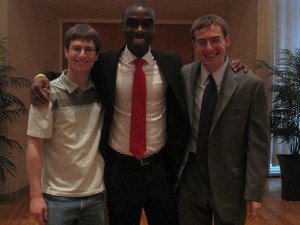Today, Brandeis held its 60th commencement ceremony, graduating the undergraduate class of 2011 from the Gosman Sports and Convocation Center. The Heller School for Social Policy and Management’s graduation took place in Spingold Theater and the International Business School in Levin Ballroom, earlier in the day. As part of the undergraduate ceremony, David Brooks, Thomas Buergenthal, Nancy Gertner, Yo-Yo Ma, Errol Morris and Jehuda Reinharz all received honorary degrees from the university. For full coverage, bios of the honorees and audio recordings of the ceremony, visit Brandeis’ Commencement page.
Brandeis has accumulated some notable graduates over the years, including Abbie Hoffman and Angela Davis, but especially those who we have awarded honorary degrees. Some names that stand out appear below.
Political Sphere: Herbert Lehman (after whom CUNY Lehman College was named), Anna Eleanor Roosevelt, Harry S. Truman, John F. Kennedy, David Ben-Gurion, Thurgood Marshall, Golda Meir, Edward M. Kennedy, Walter F. Mondale, Ruth Bader Ginsburg, Madeleine K. Albright, Desmond Tutu, Coretta Scott King, Yitzhak Rabin, Susan Brandeis Gilbert (Justice Brandeis’ daughter), the Dalai Llama (listed as “Dalai Lama, His Holiness the 14th (Tenzin Gyatso)”), Nancy Pelosi, and Michael B. Oren.
Musical, Literary and Visual Artists: Leonard Bernstein, Marc Chagall, Marian Anderson, Elizabeth Bishop, Eudora Welty, Itzhak Perlman, Elie Weisel, Isaac Bashevis Singer, Steven Spielberg, John Updike, E.L. Doctorow, Barbra Joan Streisand, Wynton Marsalis, Whoopi Goldberg, Arthur Miller, Alfred A. Knopf (who started Knopf Publishing), Joyce Carol Oates, Ted Koppel, James Carroll, Ralph Lauren, Paul F. Simon.
Many of those who received honorary degrees have buildings named after them, including: Joseph M. Linsey, Samuel Slosberg (New England shoe manufacturer and president of Beth Israel Hospital), Samuel Lemberg (real estate executive and philanthropist), Jacob Hiatt (who served as a trustee at the Holy Cross; Boston University; the the former Leicester Junior College, now merged with Becker College; and as a life trustee of Clark University), Abram Leon Sachar, Philip W. Lown, David Schwartz, Lew R. Wasserman, Stanley H. Feldberg, Morton Mandel, Thelma H. Sachar, and Carl J. Shapiro.
In addition, only a handful of the honorary degree recipients earned degrees from attending Brandeis as students. They include: Michael L. Walzer ’56, Gustav Ranis ’52, Edward Witten ’71, Thomas L. Friedman ’75, Martin Peretz ’59, Oluwatope A. Mabogunje ’63, Robert Shapiro ’52, Stephen J. Solarz ’62, Michael J. Sandel ’75, Ha Jin, MA ’89, PhD ’93, Roderick MacKinnon ’78, Karen Uhlenbeck, PhD’68 and William Schneider ’66.
*All lists have been compiled in chronological order of when recipients received honorary degrees. Information taken from http://www.brandeis.edu/trustees/hdr.html
My question to all of you readers is: WHO WOULD YOU LIKE BRANDEIS TO AWARD WITH AN HONORARY DEGREE NEXT YEAR?


